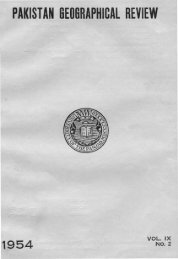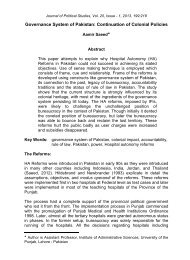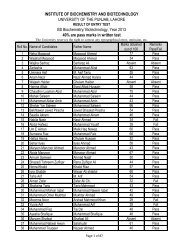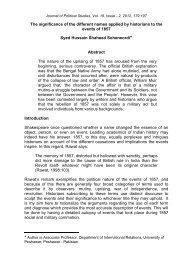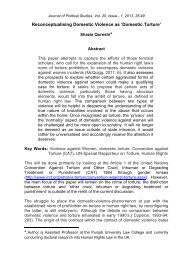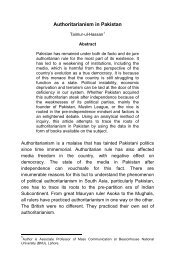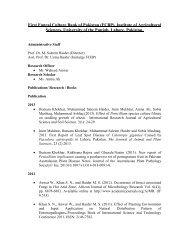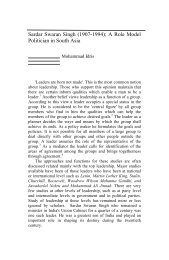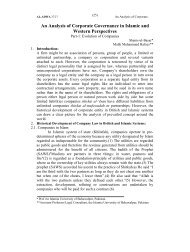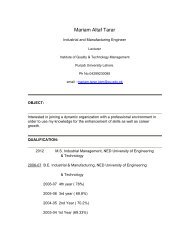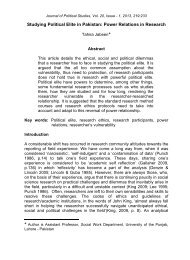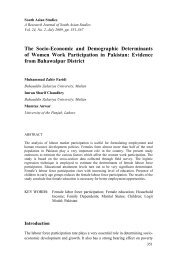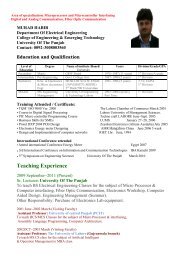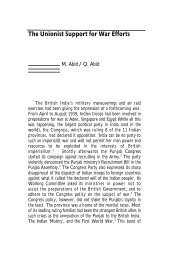Can Pakistan be a Secular State? - University of the Punjab
Can Pakistan be a Secular State? - University of the Punjab
Can Pakistan be a Secular State? - University of the Punjab
You also want an ePaper? Increase the reach of your titles
YUMPU automatically turns print PDFs into web optimized ePapers that Google loves.
Muhammad Imtiaz Zafar<br />
<strong>Can</strong> <strong>Pakistan</strong> <strong>be</strong><br />
not only to new avenues <strong>of</strong> earning, new rules <strong>of</strong> labour and new ethics <strong>of</strong> work<br />
but to a new individuality and new identity. They found <strong>the</strong>ir uniqueness and<br />
distinctiveness. They more or less got rid <strong>of</strong> <strong>the</strong> slavery <strong>of</strong> <strong>the</strong> traditional system <strong>of</strong><br />
landlord ship. As peasants <strong>the</strong>y were totally dependent on <strong>the</strong> landlord. The<br />
landlords <strong>of</strong> past had <strong>the</strong>ir pertinent exploitive culture – <strong>the</strong> Bourgeoisie thinking.<br />
It was all on his wish and whim to give or not to give <strong>the</strong> agreed or o<strong>the</strong>rwise<br />
share from <strong>the</strong> seasonal/annual yields. Even after hard work <strong>of</strong> <strong>the</strong> whole cropping<br />
season <strong>the</strong> farmer was not sure to have expected yield. They had to pray to G/gods<br />
to keep <strong>the</strong> wea<strong>the</strong>r friendly and conducive for <strong>the</strong> proper returns <strong>of</strong> <strong>the</strong>ir hard<br />
work. While coming to urban centres and getting employment in mills and<br />
factories, <strong>the</strong>ir fatalistic nature changed into a realistic tone. They got <strong>the</strong> wages as<br />
was agreed <strong>be</strong>tween <strong>the</strong> owner <strong>of</strong> <strong>the</strong> mill and <strong>the</strong> worker. It gave <strong>the</strong>m a new self.<br />
They even did not need G/god’s interference for getting <strong>the</strong>ir wages. God<br />
practically <strong>be</strong>came irrelevant. Britain has a privilege that <strong>the</strong> major winner in <strong>the</strong><br />
war <strong>of</strong> science and religion was born here in <strong>the</strong> middle <strong>of</strong> <strong>the</strong> nineteenth century.<br />
Charles Darwin laid <strong>the</strong> basis for a radically new way <strong>of</strong> looking at humanity and<br />
declared that human kind is a product <strong>of</strong> physical and historical process ra<strong>the</strong>r than<br />
<strong>be</strong>ing made in <strong>the</strong> image <strong>of</strong> God, and is subject to <strong>the</strong> same laws as <strong>the</strong> rest <strong>of</strong><br />
nature. In this ‘<strong>the</strong> march <strong>of</strong> science’ era, not only metaphysical but societal<br />
phenomenon <strong>be</strong>came subject <strong>of</strong> scientific enquiry. Similarly, philosophers <strong>of</strong> <strong>the</strong><br />
century like Her<strong>be</strong>rt Spencer and August Comte delineated <strong>the</strong> evolutionary<br />
thinking patterns <strong>of</strong> human <strong>be</strong>ings. They advocated that <strong>the</strong> scale <strong>of</strong> human<br />
thought has <strong>be</strong>come positive leaving <strong>be</strong>hind <strong>the</strong> spiritual and metaphysical patterns<br />
in <strong>the</strong> dust <strong>of</strong> history.<br />
Postmodernity<br />
Postmodernity is <strong>the</strong> major <strong>the</strong>me <strong>of</strong> <strong>the</strong> nineteenth and <strong>the</strong> first half <strong>of</strong> <strong>the</strong><br />
twentieth century and that ends on long sixties – when <strong>the</strong> real secularization took<br />
place. It perpetuated <strong>the</strong> traditional centrality <strong>of</strong> religion and churches although<br />
<strong>the</strong>re had <strong>be</strong>en a considerable decline in church attendance in this period. People<br />
still continued to marry in <strong>the</strong> churches, <strong>the</strong>ir children baptised and <strong>the</strong>y sent <strong>the</strong>ir<br />
children to Sunday schools for catechism classes. Along with that moral influence<br />
<strong>of</strong> <strong>the</strong> Christian churches was great on <strong>the</strong> people. Dictates <strong>of</strong> <strong>the</strong> ethical and moral<br />
teachings was eminent in <strong>the</strong> general <strong>be</strong>haviour <strong>of</strong> people although many people<br />
did not practise <strong>the</strong>se standards very strictly. Callum Brown says, “Particularly,<br />
<strong>the</strong> years <strong>be</strong>tween <strong>the</strong> two world wars, reemphasised moral conservatives<br />
disconnecting from <strong>the</strong> li<strong>be</strong>ralisation <strong>of</strong> Victorian religious Puritanism. The British<br />
people in <strong>the</strong> later stages <strong>of</strong> <strong>the</strong> Second World War started to show signs <strong>of</strong><br />
responsiveness to a renewed conservatism in morality. The war undoubtedly put<br />
pressure on sexual purity, strained abstinence from alcohol and undermined some<br />
values <strong>of</strong> <strong>the</strong> early twentieth century Britain. Austerity <strong>be</strong>came <strong>the</strong> watchdog <strong>of</strong><br />
<strong>the</strong> age, defining a period when in <strong>the</strong> economy, in leisure, in family and in<br />
169



